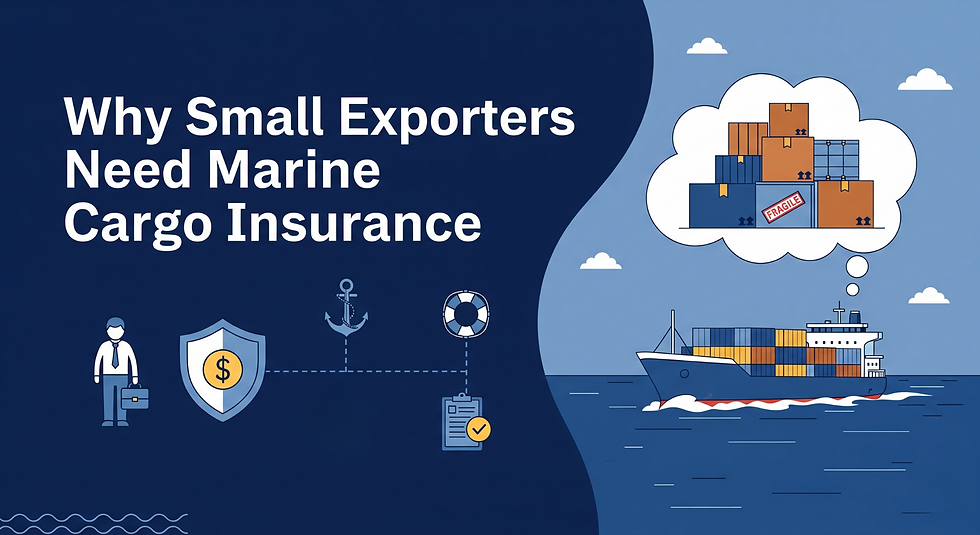Why Small Exporters Need Marine Cargo Insurance
- digital @btwimf.com
- Aug 20
- 3 min read
Updated: Aug 20

Table of Contents
Summary
Introduction
What Is Marine Cargo Insurance?
Risks Small Exporters Face Without Marine Cargo Insurance
Key Benefits of Marine Cargo Insurance for Small Exporters
Types of Marine Cargo Insurance Policies Small Exporters Can Choose
Real-Life Scenarios Where Marine Cargo Insurance Helps Small Exporters
Tips for Small Exporters to Maximize Marine Cargo Insurance Benefits
Final Thoughts
FAQs
Summary
For small exporters, a single shipment loss can wipe out months of earnings. Marine Cargo Insurance protects goods against theft, loss, and damage during transit. This guide explains why small exporters need marine cargo insurance, its benefits, and how it ensures financial security in global trade.
Introduction
Small exporters often work with thin profit margins and limited resources. When goods travel across oceans, airports, and borders, the risks multiply—natural disasters, theft, or port delays can disrupt shipments. Unlike large corporations, small exporters cannot easily absorb such losses.
This is where Marine Cargo Insurance becomes critical. It provides financial protection, builds credibility with buyers, and allows exporters to focus on expanding trade instead of worrying about shipment risks.
What Is Marine Cargo Insurance?
Marine Cargo Insurance is a specialized insurance policy that protects goods against loss or damage during transportation by sea, air, rail, or road. Despite the word “marine,” most policies cover multimodal shipments.
Covers risks like fire, collision, sinking, theft, and damage during handling.
Available for both single shipments (specific voyage policy) and multiple consignments (open policy).
For small exporters, Marine Cargo Insurance acts as a safety net that secures both shipments and business reputation.
Risks Small Exporters Face Without Marine Cargo Insurance
Theft or Pilferage – Smaller consignments are easy targets.
Handling Damage – Fragile or perishable goods risk breakage during loading/unloading.
Natural Disasters – Floods, cyclones, or accidents can destroy cargo.
Port Risks – Cargo may be damaged during customs clearance or while waiting at docks.
Financial Burden – Without Marine Cargo Insurance, exporters must bear the full loss.
Key Benefits of Marine Cargo Insurance for Small Exporters
1. Financial Protection Against Loss or Damage
A single uninsured claim can devastate small businesses. Marine Cargo Insurance ensures exporters don’t shoulder the cost alone.
2. Coverage Across Multiple Modes of Transport
Shipments often involve air, sea, and land. Marine Cargo Insurance provides seamless coverage across these modes.
3. Boosting Credibility with Buyers and Partners
Buyers trust exporters who secure shipments with Marine Cargo Insurance. It shows professionalism and risk preparedness.
4. Compliance with International Trade Rules
Many contracts under Incoterms require Marine Cargo Insurance. Having coverage ensures exporters meet trade obligations.
5. Peace of Mind in Risky Markets
Exporting to new or politically unstable regions carries higher risks. With Marine Cargo Insurance, small exporters can expand confidently.
Types of Marine Cargo Insurance Policies Small Exporters Can Choose
Specific Voyage Policy – Covers a single shipment from start to finish.
Open Policy – Covers all shipments for a set period (usually one year).
Institute Cargo Clauses (A, B, C) – International standards defining risk levels:
ICC (A): All-risk coverage.
ICC (B) & (C): Limited, named-risk coverage.
Real-Life Scenarios Where Marine Cargo Insurance Helps Small Exporters
A textile exporter’s goods worth ₹12 lakh were damaged in transit due to container leakage. With Marine Cargo Insurance, most of the loss was covered.
A spice exporter faced cargo theft at a Middle East port. Marine Cargo Insurance reimbursed the value, allowing the exporter to maintain buyer confidence.
A handicraft exporter lost shipments due to flooding in Bangkok. Marine Cargo Insurance helped recover 85% of the invoice value.
Tips for Small Exporters to Maximize Marine Cargo Insurance Benefits
Always choose comprehensive policies (ICC A) for high-value or fragile goods.
Declare the correct value of goods to avoid underinsurance.
Understand exclusions clearly—improper packing and delays are often not covered.
Work with experienced insurers familiar with export documentation.
Keep documents like invoices, packing lists, and bills of lading ready for smooth claims.
FAQ's
1. Is Marine Cargo Insurance mandatory for small exporters?
Not always, but many trade contracts and Incoterms require it.
2. Can Marine Cargo Insurance cover domestic shipments too?
Yes, most policies also cover inland transport via road, rail, or air.
3. How much should exporters insure shipments for?
Ideally, insure for invoice value + 10% to cover incidental costs.
4. What happens if goods are underinsured?
The claim amount is reduced proportionally, making full Marine Cargo Insurance coverage essential.
5. Can Marine Cargo Insurance be transferred to buyers?
Yes, depending on Incoterms, policies can be assigned to buyers.




Comments